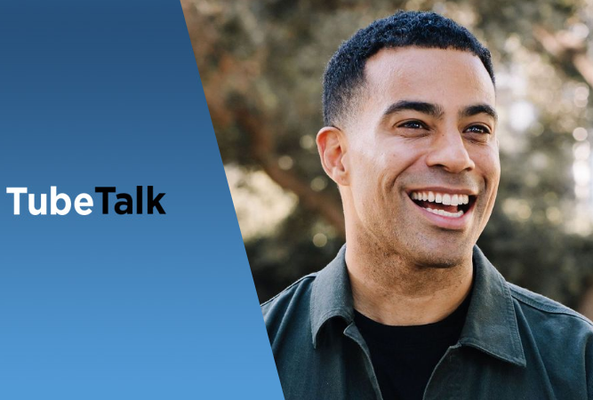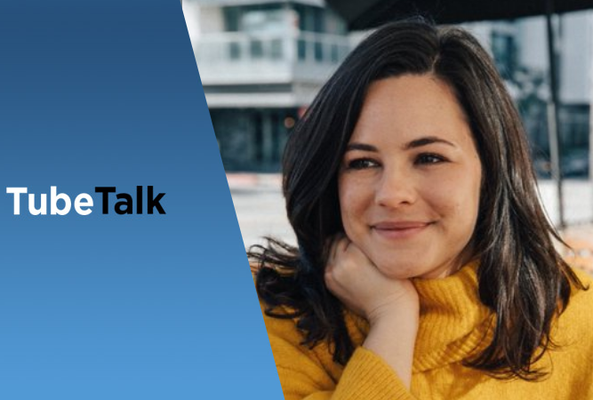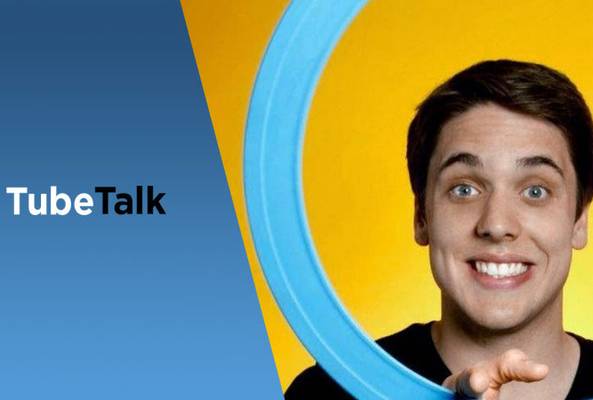Liron Segev, aka TheTechieGuy, is the Director of Customer Success at vidIQ, an internationally celebrated Digital YouTube Strategist working with some of the largest brands and YouTube influencers in the world. Over the past 20+ years, his work has taken him to South Africa, the UK, and the US where he frequently speaks at conferences and provides expert tech commentary for various print publications, radio, and TV while actively running his Tech YouTube Channel.
How to Make Your YouTube Content Go Further! TubeTalk 182 with Christoph Trappe
As YouTubers, we tend to focus only on YouTube. Yes, we boost our videos with a bit of social media here and there, but it's time to rethink that whole strategy, and repurpose our new and existing content on other platforms. On this week’s TubeTalk, we’re doing just that and discussing 360, VR, blogging, and podcasting among other strategies. If you want to know how you can expand your reach, this is the episode for you!
My special guest is Christoph Trappe, an expert in content marketing who shares a different perspective on content, content marketing, branding, and all those things that are going to help us get to that level of exposure and authority.

Subscribe to TubeTalk: The Video Marketing Podcast!
TubeTalk has been informing video creators and marketers since 2014, and is one of the most respected and listened to podcasts in the online video industry. Subscribe today so you never miss an episode! You can find vidIQ's TubeTalk at:

Making Your YouTube Content Go Further! Full Transcript
Liron Segev: Christoph, thank you for being with us on Tube Talk.
Christoph Trappe: Thanks for having me. Always my pleasure.
Liron: So give me a two second overview. Who is Christoph and why are you on planes so much?
Christoph: Why I'm on planes so much? Two seconds is a little quick, but I'll try to hit it. So basically I focus on storytelling, digital marketing, content marketing. And of course, one way to tell stories is you have to go to places, you have to go to conferences, you have to go see people whose industry you're covering. And certainly that's an important part for anybody in the industry. For myself, I do publish a blog post like every working day. I have a podcast going out once a week. It's about time to write another book. So certainly I know what works. Certainly I know what doesn't work. So I try to do more of what does work and do less of what doesn't work.
And really that's what brands have to do. The whole idea of publishing once a year and sharing something once a year and hope that works, they're mostly gone. Now if you have a huge budget, maybe you still have a shot at doing that. But content marketing and digital marketing and publishing really as one as a long game, right? So you continue and you keep going and you keep staying relevant.
Liron: And us as YouTubers who are making content, should we be doing some more stuff with that content than just uploading it on YouTube then?
Christoph: I'm a big believer in that. I know there's some big YouTube names out there who've made a good go on YouTube and sharing their content on there.
The model I like to follow is ‘create once, publish everywhere!
But then once you have the video, use the content to either, if you have audio, either you do a podcast version of it. So that's one idea. Sometimes they're too short, but sometimes you have enough audio to make that work. And then the other thing is write an article. Right? Articles still matter. And if you think you're not a writer, do a transcript. You'd be surprised how many people actually read transcripts of blog posts of podcasts.
Liron: Yeah, absolutely. I mean we do this all the time on Tube Talk. Like for example, when this episode will be done, we'll send it off to transcription, we'll write a blog post about it so that you can consume the information in any way that works for you. The big thing about writing, which is why I'm still a blogger and why I firmly still write and I believe in the blogging world, is because you know what you can do with text. You can copy and paste it. You can print it. When it comes to audio and video, you've got to consume it in a different way, but it's very difficult to take kind of another step. You're kind of a checklist. So I like the idea of taking content and repurposing it. VR and 360.
Christoph: Yeah. So first of all, I need to think about the shots and what's the story I need to tell. So that's nothing new to VR, right? That's video production 101. What's the story you're trying to tell? What are the shots you need? And you know, in, video production you have, you typically go a wide shot, a close up, a medium shot and there you go. If you shoot nothing else, that'll probably get you most of the way there. But in VR, what's interesting is, so that still applies. So when I go to a conference, I was in in Madrid and I thought, I really like the setup. I want to do a VR version of my own talk, right? Or I go to a booth and I think about what do I do? And so there's two ways to shoot it.
One is the selfie style. And you can hold the camera. So first of all, let me back up a little bit. First of all, it's an attachment to your iPhone. So you plug it into your iPhone and then you basically hold the iPhone upside down. So it feels very strange when you first do it. And then it records all the way around you and up and down. So if you hold the phone you can do that. And I have done that and it works sometimes. So I was at a conference, they had a beautiful booth. I said, "Hey, why don't we do a tour of the booth? And we walk through the booth together." So that kind of worked, right? We're on the one side of the video the whole time. I don't always like to do that because you're always in the shot. It's kind of interesting. But anyway, sometimes it works.
The other way, which I like better, is I determine what shots I need and then I put the camera with the attachment on it. I put it wherever I need it, wherever I want it to shoot. So keep in mind, you're shooting around and and down, so you want to put it in the middle of something. And so if you're at a conference, you literally want to go in the middle of the room and just put it right there.
And then you just let it sit there. You just let it roll and basically you treat it as B roll. And then once you have a couple of minutes, you go somewhere else, you get another shot and so forth. A lot of times I like to record voiceover or like an interview with somebody. Sometimes I do it in the shot so you can see us but you can't see the lips. So you can see we're there, but you can't see us close enough that you can tell that we're actually recording that with a different device. But it's close enough when it's put together.
Liron: It's crazy how much technology has evolved and how much it's made it possible. And just for those who don't know, if you don't have an iPhone, you could still do 360. There are different attachments for Android and there are also standalone cameras.
Christoph: Exactly.
Liron: We started mentioning a little bit earlier about taking your YouTube videos and maybe doing some other stuff with it. We ran through it pretty quickly. So let's break it down a little bit more. So one of the things you said was maybe taking the audio and using that for a podcast. Let's unpack that a little bit. How do you do that?
Christoph: So that's the easiest one. Especially if you're talking, if you have audio for more than 10 minutes or so, right? You can use that audio and use it as a podcast. And it's so easy now to publish podcasts. I use Anchor and automagically, it sends it to like eight channels. I don't have to do any work. So that's an easy way to do it. Of course, depending how you record your audio, there might be more work involved.
I typically, for the most part, whether I shoot video... Well if I'm on camera, right, I just do it on camera. But if I'm not on camera, I typically use the audio recorder app on my phone and then that exports as an MP3 and I can ship that directly to Anchor from my phone. There's a direct upload button. And then I can also ship it over to myself or my editor or whoever's working on the video to use the audio for the video.
Liron: So you're almost kind of splitting the, taking that soundtrack out of the video. And do you normally cut it up a little bit or do you normally add some introduction or do you just leave it raw as is?Whatever came off the camera, that's what I'm going to use.
Christoph: It all depends. Right? If we had a really good conversation and they were no mistakes made and anything like that, sometimes you use the whole thing. I'm typically, just because people are saying ums and ahs once in awhile, I'm not a big, like we don't have to over-engineer things. Sometimes I interview people and they actually make a mistake. I'll cut that out, we'll cut it out. It's not a big deal. But if people have a good conversation, it makes them sound more human. If there's not big breaks in between, just kind of let go. But it all depends, right? You have to listen to it.
Sometimes, the other thing is when you do video on audio together... So let's say, I don't even know how long we've been talking, but let's say 20 minutes or so. I mean my VR video probably won't be 20 minutes, honestly.
So you have to kind of pick and choose what you use for that purpose. And podcasts, especially where people listen to them on their 45 minute commute in the morning or at the gym for an hour, podcasts can be longer and they're really just the new version of radio. People just listen and then do something else.
Liron: So that do you like about the various platforms that each one has a purpose. So when you're doing a YouTube video, whether it's 360 or not, you're demanding people's attention. They can not be doing something else. They pretty much focused on the screen for however long the video is. That's why they're there. They're there to watch. When you're doing a podcast, people put it on more as a background thing whilst you're doing something else. As you said, you're at the gym for an hour, you're going to listen to a whole bunch of episode of Tube Talk because you want to get really cool with your YouTube channel. So you put it on, you hit play and you let this thing just run.
And then when it comes to blogging, I know you write blogs daily. We produce content in a written form and written form is a different story. So it's all about understanding the audience and what you can offer them on each individual platform. Is blogging dead or is it just evolving or what is your take on that written form?
Christoph: No, it's not dead at all. In fact, it's the best channel to get found, right? Because as far as I know, Google still does not necessarily index my videos, right? That's why we do transcripts. That's one reason why we do transcripts. And Google search is still an important thing. And you have to write to actually get that. So now people are saying you have to write longer, sometimes you do. But I've had articles who are pretty short who rank really high because they answered that question that people are searching for.
So again, the answer is it all depends. I think the problem why people say blogging is dead or they don't want to blog is because the term, right? So people don't like the term. So if you go to a CEO and say, "You should blog." And I think the CEO, in his or her mind, they have this image of somebody like writing about what they had for lunch.
Now, there is some value to share what you had for lunch if there is a story around it. That doesn't mean you should all... And it depends on your audience. So, the latest thing I podcasted about or blogged about, I don't even remember. On my own podcast, I now start off with, and I say something like, "Hello content creators and business storytellers" and then I jump in. So people would go, "Hey guys." And I think that's sometimes too informal, even though I've done that. And then people say, "Hello everyone." And I'm like, "Well it's not everyone you're talking to even though you're all welcome."
So what I started to do is, this is the audience this is actually intended for and I make it more conversational for them and I invite them in. So as long as you know your audience, as long as you write for your audience, as long as you have something of value to say, as long as you solve their problem, blogging is not dead. It's still a fantastic tool to drive business. And I would highly recommend it, no doubt.
Liron: And now that Google is merging both video content and written content, the two worlds are colliding fast and furious. Yes, YouTube is indexing your videos. Google is indexing your videos and starting to understand more and more content. But end of the day, if you just make it easy and you have a blog post for your video, well you've just given YouTube and Google two amazing signals saying you're going to answer this question and that is just absolutely gold. Do we still need to build authority when it comes to that? I mean do you kind of gravitate towards certain people, certain blogs, certain content? Or do you kind of just pick the answer that's near the top and see what works?
Christoph: So that's a fantastic question. You still have to build authority. Brand awareness matters. I'll give you an example. Meetings Today is one of the brands I work with and I was at an event. And so there's a print edition that people get and then there is an E newsletter that people get. And then there is the website, of course. I had meeting planners tell me, they said, "When I'm searching for an answer and Meetings Today is the first result or even the third result. But I see it, I'm clicking because I know Meetings Today, I know that you guys are credible." So if the first one is newtoeventplanning.com or something like that. Just making that up. I have no idea if that exists. You don't know them. So brand awareness does matter and it does matter in search too.
And the other thing, while we're talking about search, you know what else matters in search? And people always say it doesn't, and they're wrong. Social media. So when you search... I bet, we should do it for your name. When I search for my name on Google, do you know what all the top hits are? It's my books. It's my social media channels. It's my blog. But social media is right up there. So social media matters, right? So make sure you have all those different areas covered.
Liron: Well, at the end of the day, it's all about discoverability. Everything begins at the Google search box. If you're applying for a job, they're going to Google your name. What your reputation is all about. What is your legacy? What's your history? What are people saying about you? That is absolutely critical. So even though we're YouTubers and we're kind of putting out YouTube content, we have to start thinking bigger. Do you have any tips for us? How do we self brand ourselves to go beyond just being a YouTuber?
Christoph: Well, I mean at the very least what you can do is have a website and embed your videos on that website, right? And then still grow the YouTube presence, but share that link, right? Send people there. And I know that's not a new strategy. I see people do that all the time. But then slowly start using the other channels as well.
And the other reason why that's actually very important, and we see the news all the time, right? YouTube cuts monetization, YouTube cuts that, YouTube changes this... It diversifies your revenue, right? And it diversifies your reach. So if YouTube changes something... Or I'll give you another example. Blab was one of those channels back when, and I put all my eggs into that. Then they closed overnight, right? Like on a Friday night or something. They said we're closing in like two hours.
So that's another reason. Who knows what's going to happen. And will YouTube shut down? Probably not. But Google shut down Google trips the other day, which I thought was one of the biggest, one of the best products they had. I used it all the time. It gave me recommendations of what to do in a city. It gave me other ideas. So the Google cemetery of products is a real thing.
Liron: Oh, and you're not in control. I mean, when you're building your entire business on somebody else's property, you're just renting. I mean it's up to them. You have no control. But when you run your own website, your own blog, you're actually in charge. You can control your own notification by building a mailing list. You can talk to your audience because they know you and you've got email addresses, you've got social media links. You're building your own castle, on your own properties.
So looking at this landscape as a whole and you're talking to brands, so you kind of see it on all sides. Being kind of a journalist, you see it from there. You cover events, you're live tweeting at other people's events. You're writing articles. You're creating all the 360 content, videos and podcasts. What has got you kind of really excited at the moment?
Christoph: At the moment? I think trying new things, virtual reality is probably a top of the list right now. I think it's a highly emerging market. I'm still wondering how it will actually evolve. Because today we can consume content and do like eight other things. But when we get to the real true virtual reality, right? You have to put on the headset and you can't do anything else. So then of course the next step is are they now going to show me ads when I'm in a virtual reality environment? I get it, right? They have to be revenue streams. So that's certainly going to evolve.
The other thing, artificial intelligence is another thing that it's not really a new thing, but marketers really need to get ahead of that. And there's so much potential with artificial intelligence, whether it comes to personalized content or whether it comes to nurture campaigns and other things like that. We're really, really early on in that process, but it certainly can help us as we move forward and try to be relevant.
Liron: Yep. AI is coming fast and furious. Fake news is going to be even worse. Fake videos are going to be coming out. Where you're not sure whether you're looking at the real thing or just some artificially created avatar that looks like the real thing. It's a very, very fast changing world that we live in. And as you started off by saying, for less than $150, you can literally walk into an event with an entire studio kit ready to go and within minutes be set up and start to broadcast live if you wanted to, record in 360, record audio, record video, transcribe it later and there we go. You've repurposed your content in four or five different ways just from stuff that you can carry in your pocket. So that has been a real eye opener. Good to think way beyond just the YouTube platform, but this bigger world of search and credibility, authenticity and good storytelling. So what have you got going on?
Christoph: Yeah, always the connect with me over on my blog, authenticstorytelling.net. Feel free to look me up on LinkedIn. Twitter at @CTrappe. I'm always happy to connect.
Liron: Christoph, thank you very much again for spending your time with us and sharing a different side to what we customed as YouTubers. Maybe we need to start thinking different. Maybe we need to start thinking way bigger than just the next video and just uploading it to one platform.
Christoph: You bet. Good luck everyone. Thanks for having me on the show.
Want To Get More Views on YouTube?
If you want to take your YouTube channel to the next level and get more views on YouTube then make sure to download vidIQ. Join over 1 million other users and use vidIQ to help you research YouTube, analyze videos, audit your own channel, and take actionable steps click here to install now!



